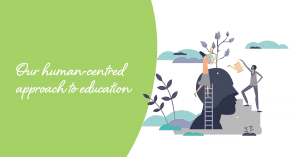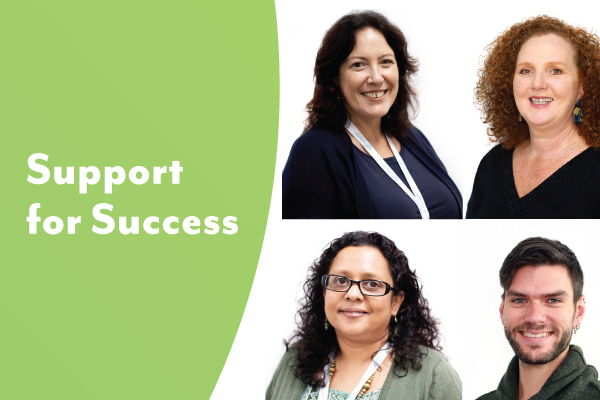When it comes to gaining qualifications, the focus should be on the learner first and foremost. This is the key message carried within human-centred education — an approach to learning that puts the individual at the centre of their own learning experience.
At Practical Outcomes, we believe that human-centred education is a better way forward for those who want to expand their knowledge and skillset while also growing as an individual on many levels.
Promoting the development of personal qualities and interpersonal skills like creativity, self-reflection, adaptability and more, human-centred education takes a holistic approach to the learner. The result is an empowered training journey and the ability to flourish on a personal, academic and professional level.

What is human-centred education?
As the name suggests, human-centred education is centred around the human undertaking the course. Delivered alongside an in-depth and up-to-date course curriculum covering practical and theoretical learning, human-centred education ensures learners have the highest quality training available. After all, at the end of your course, it’s not your qualification that heads out into the workforce — it’s you, the learner.
Human-centred education can be better understood by breaking it down. There are four key elements, which are: the aims of the training, the character of the training process, the nature of the learning and the needs of the learners.
The aims of the training
Training should aim to impart knowledge and practical skills, while also contributing to the development of the learner as a person.
The character of the training process
The training process should be valuable beyond its end result, encouraging learners to engage with the educational process and take ownership of the experience of learning rather than simply ‘getting to the end’.
The nature of the learning
Rather than just acquiring knowledge and skills, a human-centred education approach extends the nature of the learning to incorporate personal development and a focus on soft skills that will support learners to flourish.
The needs of the learners
We frequently communicate with learners to ensure our training meets their needs, including adequate support, engaging content and delivery, and accessible platforms.
Providing a human-centred education approach to those studying early childhood education means combining the essential practical skills and theoretical knowledge with interpersonal skills and human qualities. The result: a more caring and compassionate approach to the workplace.
The benefits of human-centred education approach for learners
The success of our learners on every level is a priority at Practical Outcomes. Professional goals and personal goals are often linked, so taking an approach that understands this and encourages personal development through education and career growth can lead to excellent outcomes.
When a learner is given the encouragement to reflect on the learning material from a human perspective and explore their learning and how they connect to it on a personal level, they are in a great space from which to grow. Human-centred education enables learners to relate to their training in a way that makes learning the necessary skills and knowledge for their course come naturally.
In early childhood, developing soft skills can be highly valuable and are often considered as integral for success in the sector. Working on these while achieving qualifications can pave the way to a thriving career providing the best start for children.
Practical ways we incorporate human-centred education
A human-centred approach to education is a part of who we are and what we do. Our early childhood education courses are designed to equip our learners with all the knowledge, skills and capabilities to thrive as early childhood educators and as people.
Our human-centred education approach develops and reinforces soft skills alongside practical techniques. A tangible example of the human-centred education approach is our practical placement journals. The journal is a best-practice tool that provides an opportunity for the learner to gain deep insights from the practical application of their theoretical knowledge via focusing on essential soft skills. For example, self-reflection techniques within the placement journal enable them to gain a greater understanding of their strengths and weaknesses and to map how their perspectives change along their learning journey, to gain better results.
We support our team at every level with training to ensure they have the most up-to-date skills in fostering human-centred education, leading through compassion and supporting learners to get the most from their training.
A training journey that supports the learner
While our human-centred education approach shifts the focus on to the learner and their individual growth and development through their studies, they’re certainly not alone in their endeavours. Our focus on learner success means that you, the learner, is at the centre of our teaching, and feel supported at every learning stage.
Our learner success team provides support from the very beginning of your course right through to your successful completion of it. And even beyond that for your future training goals! It’s important for us to be there for our learners in the way that best suits their needs, commitments and preferences. That’s why our support is available via phone, email, text message, video call and face-to-face.
Human-centred education can enable learners to learn new things about themselves and gain the confidence to be in control of their careers and their lives.
To explore a supported, effective training journey, contact Practical Outcomes about our early childhood education courses.



